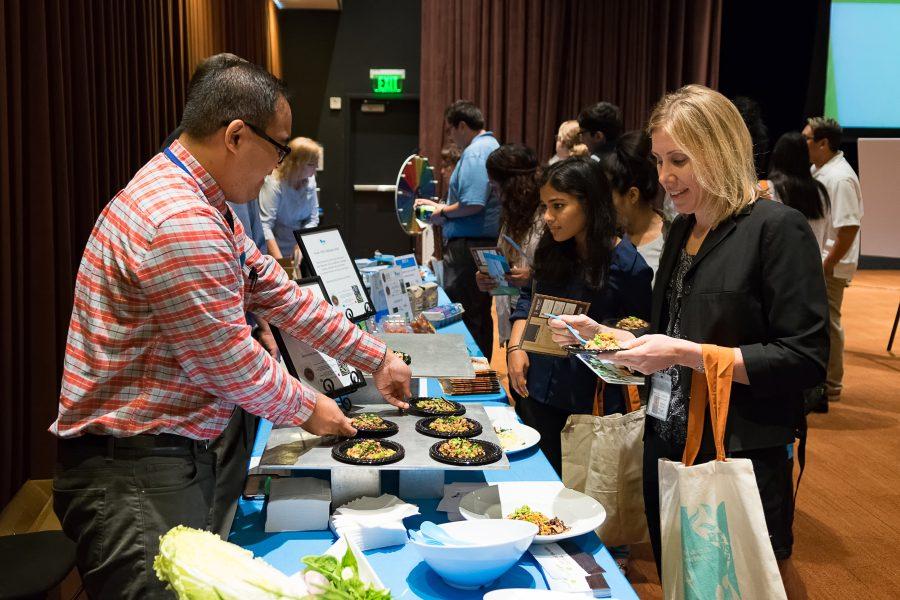The Sixth Annual Sustainable Food Expo was hosted at Price Center on Monday. The event, which aims to gather like-minded groups and individuals dedicated to sustainable food and healthy living, included a variety of organizations and departments from around campus.
The theme of this year’s expo was “toward a greener diet”, which was reflected by the focus on healthy and sustainable eating habits and the timing of the event on Food Day, a nationwide celebration and a movement toward more healthy, affordable and sustainable food.
The activities of the expo ranged from presentations of academic research in agriculture, food security and microbial systems, to campus resources such as community gardens and student organizations, to cooking demonstrations by HDH and the Center for Integrative Medicine.
Muir College senior Ismael Ramirez got involved with the expo through his role as the sustainability coordinator under Hugh Hagues, the assistant director of retail operations for University Centers.
Ramirez started learning about the importance of sustainable food as a freshman through student organizations and the community gardens. Since then, has become more involved in sustainable and healthy food issues and activism throughout his college career. He wanted the expo to convey the impact that eating has and how being more thoughtful about our everyday actions can have a large effect on the environment and people around us.
“When thinking about sustainable food, we want to think about where it’s sourced from, how far does it travel, how much water it uses, who is growing it, who is picking it, all the people in this whole chain,” Ramirez told the UCSD Guardian. “When you’re eating a piece of food, it’s not just you but it’s everybody involved in the whole process. It has a really big impact, and even small changes can make a really big positive change.”
One of the participating booths at the expo was the Food Recovery Network at UCSD. It is a community service-based student organization centered on sustainability and social justice that works to recover food that would otherwise be considered trash and go into landfills from various on-campus food vendors such as the weekly Farmer’s Markets, various dining halls and soon, the Faculty Club.
FRN’s Public Affairs Officer Natalia Herret emphasized the importance of having these kinds of expos, not only for the organization but for the general education of the public.
“We believe it’s important to be a part of the conversation towards a more sustainable relationship with food, and a healthier attitude towards issues like food insecurity,” Herret said. “Everyone should be able to eat in a world where there is more than enough food to feed all people. We throw a lot of food away and it’s wrong. We think it’s socially irresponsible and ecologically dangerous to live this way as well; climate change is very real. It’s important for our university to hold a space for this type of conversation and we also hope to network with others who are likeminded.”
She also linked the conversation to the larger picture of why events like the expo are important to not only to start the conversation, but start a shift in our mindset about food.
“We need a revolution in our relationship with the earth and with food,” Herret told the Guardian. “Food is a precious resource and we waste too much of it. Organizations like [FRN@UCSD] make a huge difference. We have recovered over 2,000 pounds of food so far from February until now. In short, over 9 months we’ve been able to do this and we are seeing a demand for our work. Sustainability issues are going to be some of the most important issues of our generation.”








